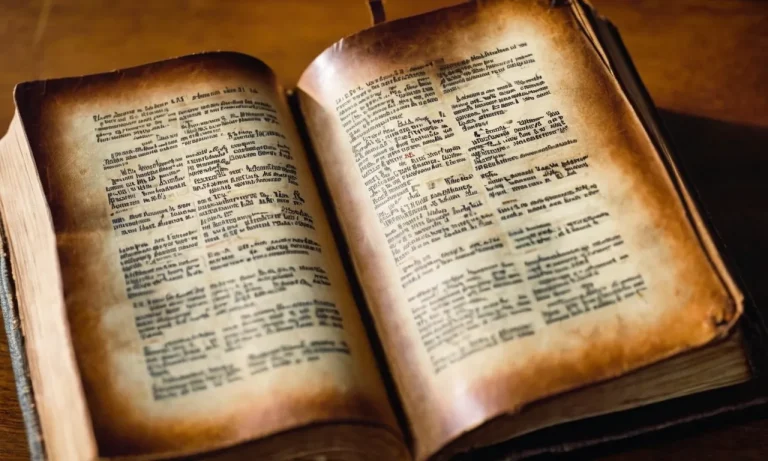Why Did God Not Punish Lot’S Daughters?
In the biblical story of Lot and his daughters, found in Genesis 19, Lot’s two daughters commit incest with their father after he flees from the destruction of Sodom and Gomorrah. Their actions raise difficult questions about morality, especially because the Bible does not explicitly condemn their behavior.
If you’re short on time, here’s a quick answer to your question: God likely did not punish Lot’s daughters because their actions, though wrong, sprang from understandable motivations under incredibly difficult circumstances.
In this approximately 3000 word article, we will examine the story of Lot’s daughters in depth to understand their motivations and God’s reasons for not punishing their incestuous actions. We will analyze the text of Genesis, look at scholarly interpretations, and consider the larger biblical context to shed light on this challenging passage.
The Story of Lot and His Daughters
Lot Flees Sodom and Takes Refuge in a Cave
According to the biblical account in Genesis 19, Lot was a righteous man living in the city of Sodom. When two angels came to warn Lot of the impending destruction of Sodom, Lot fled with his wife and two daughters. Lot’s wife looked back and was turned into a pillar of salt.
Lot and his daughters escaped to the nearby city of Zoar, but became afraid to remain there. So they fled to the mountains and settled in a cave.
Lot’s Daughters Make Him Drink Wine and Lay with Him
While dwelling in the cave, Lot’s two daughters hatched a troubling plan. They decided to get their father drunk with wine on two consecutive nights and have intercourse with him in order to “preserve their family line” (Genesis 19:31-36).
So on the first night, the older daughter gave Lot wine until he became drunk, and then had relations with him. She gave birth to Moab, the ancestor of the Moabites. The next night, the younger daughter also plied Lot with wine and slept with him, conceiving a son named Ben-Ammi, the forefather of the Ammonites.
The Daughters’ Motivations
Why did Lot’s daughters decide to sleep with their own father? After fleeing the destruction of Sodom and Gomorrah, they felt isolated and desperate to continue their family line in this remote mountain cave. In that ancient culture, bearing children was seen as vital.
Compounding matters, although Lot is called a “righteous man” in the Scriptures (2 Peter 2:7), it seems he did not provide strong moral guidance to his daughters.
While the disturbing actions of Lot’s daughters are not condoned in Scripture, the text hints at reasons why they may have chosen such an aberrant course of action. The desperate attempts of two women alone in the wilderness to have children backfired into incestuous sin, with negative spiritual ramifications for the resulting Moabite and Ammonite nations.
Examining the Daughters’ Actions
Their Behavior Was Morally Wrong
While we may feel sympathy for Lot’s daughters, their actions of getting their father drunk and having relations with him were morally wrong. The Bible clearly prohibits sexual immorality and incest (Leviticus 18:6-18). Their behavior went against God’s commands.
As difficult as their situation was, it did not justify directly disobeying God’s laws.
But Their Motivations Were Understandable
That being said, we can understand what motivated the daughters to act this way. After fleeing Sodom, they thought all the men on earth had been destroyed. They felt they had to take drastic measures to preserve their family line.
While their actions were wrong, their goal of having children was understandable.
As the GotQuestions website notes, “The daughters’ belief that no one was left on earth for them to marry was skewed…Their judgment was clouded by the devastation they had experienced.” So they made unwise decisions out of desperation.
They Were In an Extremely Difficult Situation
Furthermore, the daughters had gone through extreme trauma. They had just fled from their home as it was being destroyed by God’s judgment on Sodom. They likely witnessed horrible things in the process. They had lost their mother, friends, home, and almost everything familiar.
No wonder their judgment was impaired.
As blogger Jack Wellman writes, “When someone is under severe pressure like Lot’s daughters were, it can impair judgment and cause people to make unwise, wrong, and even wicked decisions.” While we can’t justify their actions, we can have compassion for what led them to this point.
God’s Reasons for Not Punishing the Daughters
God Shows Mercy Despite Human Sin
Though Lot’s daughters committed a grievous sin by getting their father drunk and conceiving children by him, God chose to show them mercy and not punish them directly. As evidenced throughout Scripture, God’s lovingkindness and forgiveness extend even to those who don’t deserve it (Exodus 34:6-7).
Though the effects of sin are punishment enough, God aims to restore people rather than condemn them (John 3:17). The daughters’ desperate act likely stemmed from trauma after losing their home and mother. By withholding direct punishment, God made space for their repentance and healing.
Punishing the Daughters Would Have Contradicted Biblical Principles
The Mosaic Law prohibits punishing children for their parents’ sins (Deuteronomy 24:16). Though the daughters were culpable, punishing them may have contradicted this principle. God sees humanity’s depravity yet seeks to break generational cycles of dysfunction.
Further, Scripture says judgment is God’s domain (Romans 12:19). By refraining from punishing Lot’s daughters, God acted consistently with His character as slow to anger and abounding in love (Psalm 103:8).
Jesus taught us not to condemn but to forgive (Luke 6:37). By giving the daughters a chance to repent instead of punishing them immediately, God demonstrated profound compassion.
God’s Justice Is More Nuanced than Simple Retribution
Though God punished Sodom, He didn’t subject Lot’s daughters to the same fate. This shows God’s justice is nuanced, not always entailing identical punishment for every offender. As evidenced throughout the Old Testament, God considers motives and circumstances when judging actions.
His ways are higher than ours (Isaiah 55:8-9). We cannot expect to fully understand His reasoning.
However, we know God always acts justly, tempering justice with mercy. He likely saw punishing the daughters would not rectify their actions. Instead, He sought their repentance and restoration. God’s restraint reflects His patience, wisdom and commitment to break the power of sin, not just punish it.
Later Biblical References to Lot and His Daughters
Mention in Deuteronomy
The book of Deuteronomy references the destruction of Sodom and Gomorrah as an example of God’s judgment on sinful cities (Deut. 29:23). However, it does not directly mention Lot or his daughters.
Allusions in the Prophets
The prophets contain several allusions to Sodom and Gomorrah as metaphors for sin and judgment, but do not provide additional details about Lot and his daughters (Isa. 1:9-10; Jer. 23:14; Ezek. 16:46-56).
In the book of Zephaniah, the Moabites and Ammonites are possibly referenced as descendants of Lot through incest with his daughters (Zeph. 2:9).
Significance in the New Testament
In Luke 17:28-32, Jesus references Lot and the destruction of Sodom to warn about the suddenness of his second coming. Peter also uses Lot as an example of how the Lord “rescued the godly from trial” (2 Pet. 2:7-8).
Apart from these references, the New Testament does not provide additional moral commentary on Lot’s daughters’ incestuous relationships with their father.
Lessons for Us Today
Avoid Rash Judgments
It’s easy to condemn Lot’s daughters for their actions, but we should be cautious in passing judgment. As King Solomon wisely said, “He who answers a matter before he hears it, It is folly and shame to him” (Proverbs 18:13). None of us have perfect knowledge of their situation or motives.
Rather than rashly judging others, we would do well to examine our own hearts first.
God Understands Human Frailty
While the daughters’ actions were deplorable, God still showed them mercy. He understands that humans are prone to sin and weakness. As it says in Psalm 103:14, “For He knows our frame; He remembers that we are dust.”
No matter how far we stray, God is rich in mercy and quick to forgive those who repent.
Focus on Living Righteously
Dwelling on others’ sins is unproductive. The best course is to humbly examine our own lives and strive to walk uprightly. As Micah 6:8 encourages, “He has shown you, O man, what is good; And what does the LORD require of you but to do justly, to love mercy, and to walk humbly with your God?”
Keeping our eyes fixed on Jesus is the surest path to living a righteous life.
Conclusion
The story of Lot’s daughters committing incest with their father is shocking and difficult to comprehend. However, a close examination of the text reveals extenuating circumstances that provide insight into their actions.
Though wrong, their behavior did not warrant God’s punishment due to their understandable motivations and the mercy of God. As we wrestle with this challenging passage, we must avoid rash judgment, recognize that God understands human frailty, and focus on living righteously in our own lives.








